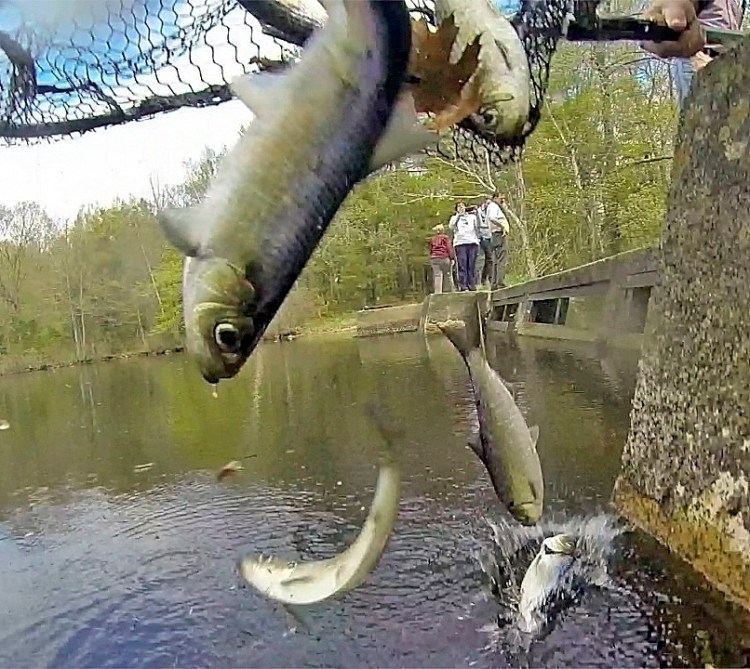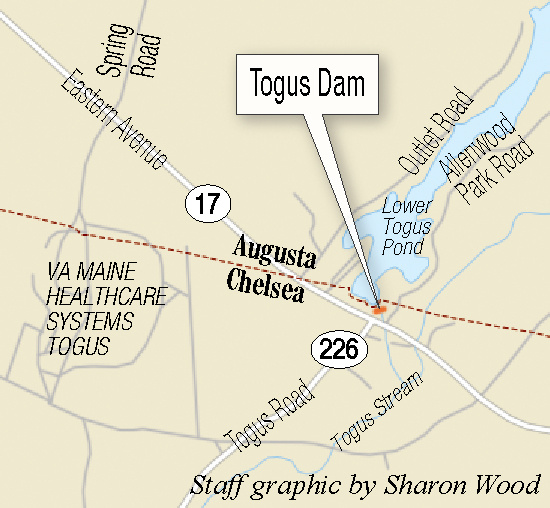AUGUSTA — The association of property owners on Togus Pond that owns and operates a dam is looking to give up its sole ownership and instead share responsibility for the dam with the municipalities of Augusta, Randolph and Chelsea.
Association leaders plan to make their pitch Thursday to the Augusta City Council and have already had initial discussions with town leaders in Chelsea, where the dam is located, and Randolph, through which Togus Stream runs on its way from the pond to the Kennebec River. The dam is used to control water levels on the body of water, which is surrounded by hundreds of homes and camps.
Most of the valuable real estate surrounding the pond is in Augusta. City Manager William Bridgeo said there are roughly 400 properties on the pond in the city, together making up a significant portion of the city’s property tax base.
The Worromontogus Lake Association has owned the dam, originally built in 1804, since 1932. The stone masonry and cast concrete dam was “substantially rebuilt” in the mid-1980s, according to association leaders, and a 2013 inspection deemed it to be in good condition. It is about 25 feet long and 7 feet high and there are plans, as yet unfunded, to build a fishway to allow passage of alewives past the dam to and from Togus Pond.
Greg Jolda, president of the association, said as a private association, the landowners’ group is unable to get liability insurance on the dam, nor do association members have the expertise to operate and maintain the dam, especially if a fishway is added. He also said municipalities have access to grants and funding sources that could be used at the dam that are unavailable to a private organization.
He said currently an association member maintains the dam by checking on it about once a week. That involves moving boards that hold back water, as needed, to control water flow in the stream below and the water level in the pond above.
“The dam is going to become more important, because we’re going to build a fishway. There are going to be more potential liability issues,” Jolda said. “It’s going to be more complicated. The typical way to handle some of that is with shared ownership, of the people involved.”
However, with ownership of a dam comes the responsibility to operate and maintain it.
“They’re requesting the city assume ownership, fully or with others, which comes with significant responsibilities and liabilities,” Bridgeo said.
The cost of operating the dam, however, could be offset by potential revenue from selling licenses to fishermen, who net alewives and use them as bait, notably as lobster bait.
Jolda said that revenue could be used to help maintain and operate the dam, and potentially even be a revenue source for the dam’s new potential municipal partners if they agree to take an ownership stake in the dam.
Owning the dam also would give the municipalities more control of the flow of water from it, thus potentially reassuring waterfront property owners that water level would be maintained.
Jolda said association officials have spoken to town officials in both Randolph and Chelsea. He said Randolph officials seemed surprised by the proposal, while Chelsea officials seemed accepting toward it.
Augusta councilors are expected to discuss the proposal at their 6:30 p.m. informational meeting Thursday in the council chamber at Augusta City Center.
There are multiple examples of municipal ownership of dams in central Maine, including the Maranacook Lake Dam owned by Readfield and Winthrop, through an intra-local agreement; Cochnewagon Lake Dam by Monmouth; Cobbossee Lake Dam by Manchester; Tacoma Lakes Dam by Litchfield; New Mills Dam by Litchfield, Richmond and Gardiner; and Belgrade Lakes dams including Wings Mill Dam, Ellis Pond Dam, Messalonskee No. 2 Dam, and the Village Spillway, are owned via intra-local agreements involving Belgrade, Rome and Oakland.
Councilors in Augusta also are scheduled to:
• Discuss extending the existing moratorium on commercial recreational marijuana activity for an additional 180 days, as the Legislature continues to work on regulations for recreation marijuana following its legalization by voters in a statewide referendum question last year;
• Discuss modifying the city’s demolition delay ordinance, to specify it wouldn’t apply to properties withing the city’s new Historic District Ordinance, which has its own set of regulations for demolitions; and
• Discuss potential changes to mineral extraction and blasting rules, including a proposal to extend the licenses of the two companies that blast rock in the city, McGee Construction and Quirion Construction, while temporarily banning consideration of renewing their licenses, to allow the city to consider potential changes to the Mineral Extraction Ordinance.
Keith Edwards — 621-5647
Twitter: @kedwardskj
Send questions/comments to the editors.




